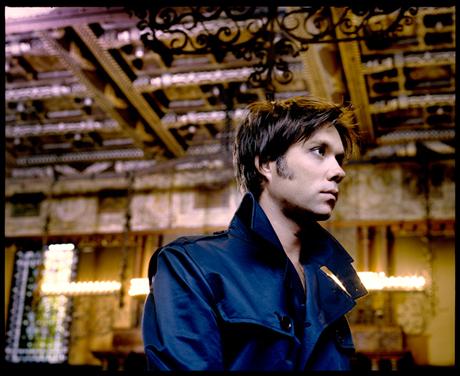The Rufus Wainwright Interview

After six albums, numerous film soundtracks and an opera, Canadian-born tenor Rufus Wainwright has shown a great deal of musical diversity in his thirty-seven years. Born to well-known folk musicians Kate McGarrigle, who passed away earlier this year of clear-cell sarcoma, and Loudon Wainwright III, Rufus and his sister Martha both shared the stage at a very young age. Rufus’s music has evolved continuously over the years from his breakthrough album Poses in 2001, to exquisite covers of Leonard Cohen’s “Hallelujah†and The Beatles’ “Across the Universe,†which were featured on soundtracks of his most recent album All Days Are Nights: Songs for Lulu and in the opera Prima Donna.
First of all my condolences on your mom. I’m very sorry.
Thank you.
I understand there is now a foundation in her name to raise awareness for the cancer that she had.
Yeah, my mom started the Kate McGarrigle Fund while she was ill and we did two or three fantastic Christmas shows [to] raise money for her fund, the last one being at the Royal Albert Hall in London, where she could barely stand, but she sung anyway. It was really incredible to watch.
I’ve seen you two perform together a number of times and I also had a chance to interview your dad so I must ask, what was it like growing up in the shadow of well known musician parents? What kind of effect did it have on you?
Well I wouldn’t quite say that I was in the shadow, only because of my own personal nature.  I was always gunning for some kind of a prime position, even at a very, very young age. I was precocious and my mother actually acknowledged that and trained me and put me up there onstage with her and gave Martha and I a lot of opportunities. We never really felt “in the shadow†but we felt kind of like smaller trees in a beautiful forest.
I hear that you really did seem to know who you were early on. You came out, sexually, at a young age. I know you also dealt with some trauma and, at age fourteen, you were sexually assaulted. How do you feel about that?
I always had a kind of hunger for knowledge and sometimes that would lead me down the right road and sometimes that would lead me down the wrong road. So I suffered all sorts of consequences whether they were good or bad. But in the end, I am experienced. I think that, certainly in my songwriting, it helped. But, that being said, in the world of classical music you know, in terms of writing operas and stuff like that, it’s a necessity in that field. You know all the great composers always write their best work when they are in their 60’s or 70’s. That’s usually the case. They are very much fed by their life experiences so I’m just trying to get as much in there as I can.
Congratulations on your opera, Prima Donna, by the way. That’s no small feat.
Yes, it ain’t kid stuff, writing a whole opera.
What inspired you to write an opera?
Well opera is basically my religion. When I was about fourteen years old I was brutally converted to the form in one evening. I was listening to a piece called Verdi’s “Requiem†and by the end of that experience, I was completely obsessed with opera, so it was almost like the genre chose me rather than me choosing the genre. I decided to write one, you know, just to pay back the deities for all their support and love over the years—the opera deities.
Do you think having done an opera, that it’s going to affect your general form of writing, even on your more popular songs?
In pop music and songwriting, I’m middle-aged. I’ve been doing this a long time and I know how to handle a lot of different situations and I have a sense of my ability. In opera, on the other hand, I’m a baby. I’ve only written one, and one can argue that most great composers that wrote opera never really get crackin’ until their third or fourth, so I’m just starting off in that world. As you progress, you have to get more and more intricate and deep and profound. It’s the beginning of a new journey for me.
In general, with your music, you’re extremely literate. You pull from a variety of different sources, from Judy Garland to Shakespeare’s sonnets and everything in-between, which is not exactly the standard. Are there popular musicians out there that you like?
I’m very, very excited by Arcade Fire’s success. They really deserve it. They work hard at what they do.
I read a little about your involvement with Blackoutsabbath and that you’ve been getting more environmental. What kind of changes have you made in your life?
Yes, my big change this year is to become a vegetarian. I’ve been doing it for the last few months. What I’m trying to do now is rearrange Blackoutsabbath and how it’s presented.  I used to have this thing where you write a list and do several things in order to [reduce] your carbon footprint. But I think what would be better now, is to do just one big thing a year.
Did you happen to see the films: Food Inc. or Tapped?
No, but I guess I’d like to see them though.
Congratulations on All Days Are Nights: Songs for Lulu. I know you grew up in New York and on the album you have a song about Manhattan titled “Who Are You New York?†What inspired that concept?
That song has a very pedestrian story, but I actually wrote it for a film that they were making about New York called “New York, I Love You.†The film-people didn’t particularly care for the song, I guess, so they didn’t use it. So I just kept it and put it on [my] album.
In a sense, film has always been such a big part of your career because many people who are not readily familiar with your work, still usually recognize your songs from certain films.  How do you feel about your relationship with film? I believe you’ve done some acting as well, right?
Yeah, I’m flirting with the genre and I definitely enjoy seeing myself thirty feet high, but it’s not something that I’m running toward passionately, only because I know how hard it is and I don’t want to get destroyed by it. It is one of the toughest things you can do, but I’m open to it.
Lastly I just want to ask what’s next for you, what are you working on now?
Well I have a song cycle that I’m preparing for in November with the San Francisco Symphony. It’s five of the Shakespeare sonnets (from All Days Are Nights: Songs for Lulu).  I’ve orchestrated them and I will be singing them with the symphony. We’re also doing some selections from my opera Prima Donna in Portland in September, so there’s a few things coming up.


